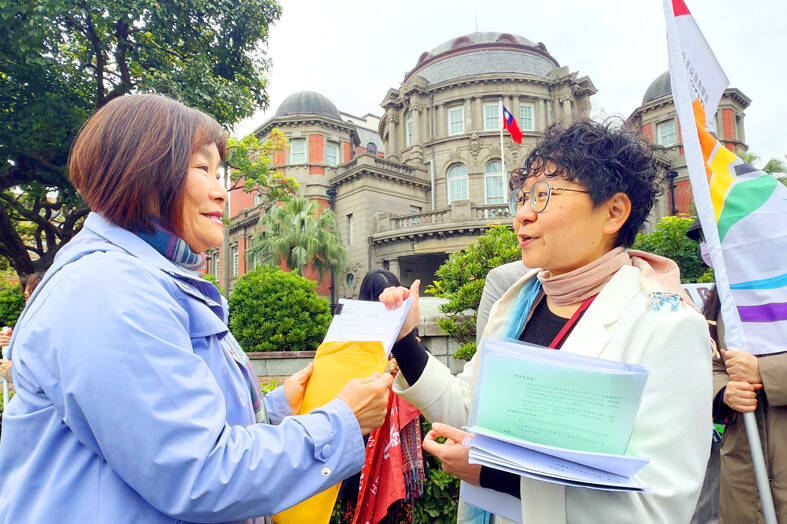Civic groups yesterday submitted a petition to the Control Yuan stating that regulations requiring transgender people to undergo gender-affirming surgery before changing their official gender designation are unconstitutional.
It has been ruled many times that forcing or mandating any type of surgery is unconstitutional, yet the Ministry of the Interior in 2008 issued an executive order requiring transgender people to undergo surgery to remove gender-specific organs before altering official documents, the groups said.
The groups called on the Control Yuan to launch an investigation into the ministry for neglecting its duties and its failure to enact the necessary amendments.

Photo: Liu Hsin-de, Taipei Times
Control Yuan member Chi Hui-jung (紀惠容) met the groups outside the Control Yuan following a news conference to receive the petition.
The conference was held by the Taiwan Alliance to Promote Civil Partnership Rights (TAPCPR) and nine other groups, including the Taiwan Association for Human Rights, Amnesty International Taiwan, and the Intersex, Transgender and Transsexual People Care Association.
The ministry on Nov. 3, 2008, issued Document No. 0970066240, informing household registration offices that transgender people wishing to change their gender designation on identification cards must present two diagnostic affidavits from psychiatrists and a certification issued by an accredited medical institution that they have undergone surgery to remove gender-specific organs.
For transgender men, the required surgeries are removal of breasts, uterus and ovaries, and for transgender women, the penis and testicles.
For many years, the groups have been arguing that these requirements contravene the principle of legal reservation under the Constitution, which regulates the relationship between the state and its citizens.
The groups have repeatedly called upon the ministry to enact amendments, saying that the regulations infringe on the rights, bodily autonomy and human dignity of transgender people.
However, after a decade, their requests continue to be ignored, the groups said.
Since Xiao E (小E) became the first transgender woman in Taiwan to change her legal gender without providing proof of gender-affirming surgery in 2021, the Supreme Court and six High Court rulings have found the directive unconstitutional, they said.
Furthermore, the UN has clearly stated that forcing surgery is a breach of international human rights that is cruel and inhumane, and is a form of gender and sexual identity discrimination, Covenants Watch chief executive Chiang Meng-chen (江孟真) said.
The Ministry of Health and Welfare in 2013 convened a meeting that concluded that legal gender recognition should be separated from medical intervention, but no policy has since been enacted to reflect this, she said.
The WHO released a new International Classification of Diseases in 2018 that reclassified gender identity from a mental disorder to a sexual health condition that would be recognized and protected, TAPCPR secretary-general Chien Chih-chieh (簡至潔) said.
The UN in 2017 also issued recommendations against gender discrimination, stating that gender identity should be based on self-identification and no transgender person should be forced to undergo medical intervention, she said.
The current directive forces transgender people to either undergo surgery as dictated by the directive or endure lengthy appeals and lawsuits to change their legal gender, she said, adding that these outdated policies must be reformed by the Ministry of the Interior.

The manufacture of the remaining 28 M1A2T Abrams tanks Taiwan purchased from the US has recently been completed, and they are expected to be delivered within the next one to two months, a source said yesterday. The Ministry of National Defense is arranging cargo ships to transport the tanks to Taiwan as soon as possible, said the source, who is familiar with the matter. The estimated arrival time ranges from late this month to early next month, the source said. The 28 Abrams tanks make up the third and final batch of a total of 108 tanks, valued at about NT$40.5 billion

Two Taiwanese prosecutors were questioned by Chinese security personnel at their hotel during a trip to China’s Henan Province this month, the Mainland Affairs Council (MAC) said yesterday. The officers had personal information on the prosecutors, including “when they were assigned to their posts, their work locations and job titles,” MAC Deputy Minister and spokesman Liang Wen-chieh (梁文傑) said. On top of asking about their agencies and positions, the officers also questioned the prosecutors about the Cross-Strait Joint Crime-Fighting and Judicial Mutual Assistance Agreement, a pact that serves as the framework for Taiwan-China cooperation on combating crime and providing judicial assistance, Liang

A group from the Taiwanese Designers in Australia association yesterday represented Taiwan at the Midsumma Pride March in Melbourne. The march, held in the St. Kilda suburb, is the city’s largest LGBTQIA+ parade and the flagship event of the annual Midsumma Festival. It attracted more than 45,000 spectators who supported the 400 groups and 10,000 marchers that participated this year, the association said. Taiwanese Designers said they organized a team to march for Taiwan this year, joining politicians, government agencies, professionals and community organizations in showing support for LGBTQIA+ people and diverse communities. As the first country in Asia to legalize same-sex

MOTIVES QUESTIONED The PLA considers Xi’s policies toward Taiwan to be driven by personal considerations rather than military assessment, the Epoch Times reports Chinese President Xi Jinping’s (習近平) latest purge of the Chinese People’s Liberation Army (PLA) leadership might have been prompted by the military’s opposition to plans of invading Taiwan, the Epoch Times said. The Chinese military opposes waging war against Taiwan by a large consensus, putting it at odds with Xi’s vision, the Falun Gong-affiliated daily said in a report on Thursday, citing anonymous sources with insight into the PLA’s inner workings. The opposition is not the opinion of a few generals, but a widely shared view among the PLA cadre, the Epoch Times cited them as saying. “Chinese forces know full well that